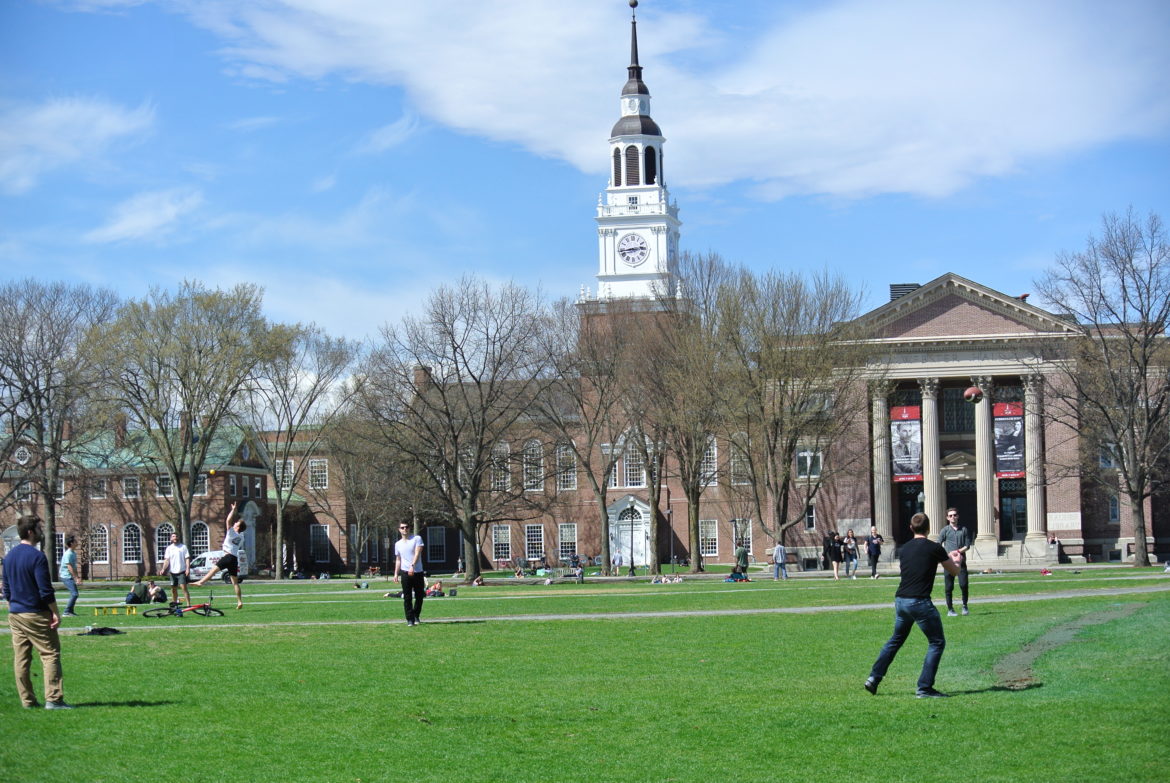
Arnie Alpert spent decades as a community organizer/educator in NH movements for social justice and peace. Officially retired since 2020, he keeps his hands (and feet) in the activist world while writing about past and present social movements.
Correction: A previous version incorrectly said the NLRB ordered Dartmouth to negotiate with the basketball players union.
By Arnie Alpert, Active with the Activists
Arnie Alpert spent decades as a community organizer/educator in NH movements for social justice and peace. Officially retired since 2020, he keeps his hands (and feet) in the activist world while writing about past and present social movements.
HANOVER—An investigating attorney for the National Labor Relations Board has recommended that the Board order Dartmouth College to begin collective bargaining with its basketball team, the first undergraduate basketball players in the country to form a union.
The Board, a federal agency which administers and enforces provisions of the National Labor Relations Act, ruled last February that the players were employees under the law and therefore eligible to form a union and bargain with the College. In an NLRB-supervised election held in March, team members voted 13 to 2 to unionize and join Local 560 of the Service Employees International Union, which also represents about 500 other Dartmouth employees, including power plant workers, custodians, security officers, trades people, and museum staff.
Rejecting the Board’s ruling and following the vote, Dartmouth’s president, Sian Bellock, said the college would not negotiate with the players and vowed to fight the unionization effort “all the way to the Supreme Court if that’s what it takes to prevent this misguided development from taking hold.”
The September 30 opinion came in response to an Unfair Labor Practice charge leveled in August by Local 560, which complained that the college’s failure to bargain was a violation of the law. Dartmouth “has no valid defense to the Complaint,” it said.
In addition to violating federal law, the college’s defiance also violates Dartmouth’s Code of Ethical Conduct which requires Dartmouth to “transact its business in compliance with laws of the jurisdictions in which it does business,” stated Chris Peck, president of Local 560.
The past two years have seen an outpouring of union activity on the Dartmouth campus. A union of undergrad food service workers, which won a significant pay increase after threatening a strike in 2023, has expanded to include Undergraduate Assistants, the college’s term for resident advisors. Graduate student workers, who unionized in 2023, won their first contract in June after a 2-month strike. A new union of librarians is in the midst of negotiating its first contract. Local 560 recently renegotiated two longstanding contracts for non-academic workers.
The Dartmouth unions are planning a “Labor Town Hall” event on October 21.
The Motion for a Summary judgment, written by Thomas Quigley in the Board’s General Counsel department, said the college should begin good faith bargaining and “agree to a bargaining schedule, which requires meeting at least once per month for at least 2 hours per session (or pursuant to another schedule mutually agreed upon by the parties) and requires [Dartmouth] to submit a written summary of each bargaining session to the [NLRB’s] Compliance Officer within five days of each meeting.”
“Our local would welcome a required bargaining schedule,” Peck said. “Bargaining would not only resolve Dartmouth’s exposure to the NCAA’s massive antitrust liability, but directly improve our members’ academic experience by relieving those on financial aid of the need to work second jobs, give them a say in scheduling decisions that force them to miss class, and create real accountability for the athletic department around varsity athletes’ physical and mental health.”
If the Board follows through with a ruling in line with the General Counsel’s motion, the college is expected to appeal the decision in the federal court system.





